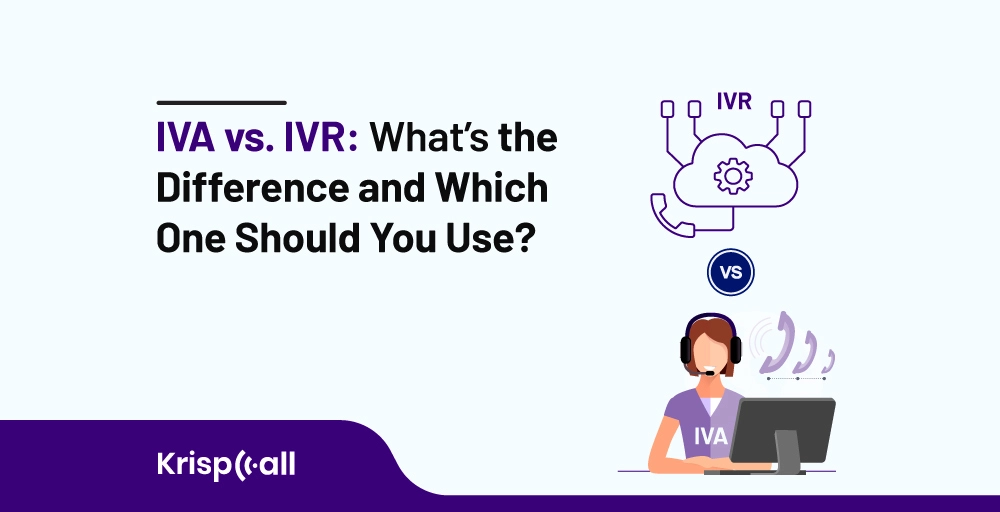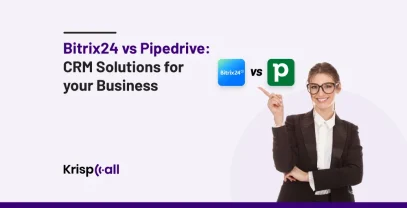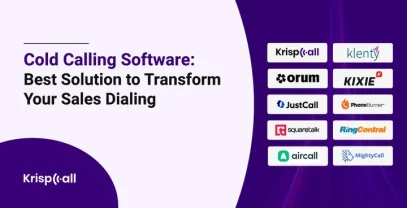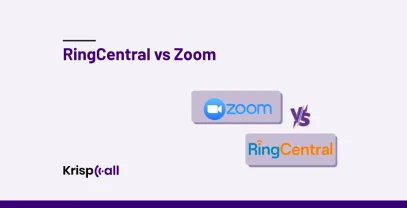Have you been unable to decide 🤔 between IVR and IVA for your business?
Choosing between IVA and IVR is tough for any business regardless of their sizes. However, there is not a clear answer, which is why companies use both of them.
It is important to understand the difference between IVA and IVR to boost customer service and enhance customer satisfaction.
In this blog, you’ll understand the definitions, features, and limitations of IVR and IVA and the key differences between IVA vs IVR.
🔑 Key Summary
- IVR stands for Interactive Voice Response and helps callers obtain information or be routed to the right department.
- IVA stands for Intelligent Virtual Agents and help matches human-like interactions to assist callers.
- The main difference between IVR & IVA is IVR commonly uses pre-recorded prompts and keypad inputs for basic call routing, while IVA is based on AI and NLP for personalized interactions and handling complex tasks.
- To choose between IVA and IVR you must consider various factors like industry type, budget, business needs, functionality, and cost difference.
- You can easily set up an advanced IVR system in your business with the help of the KrispCall cloud phone.
What is Interactive Voice Response (IVR)?
Interactive Voice Response (IVR) is an automated telephony system that enables callers to obtain information or be routed to the right department without talking with a live agent. It is commonly used in customer service, call centers, and other businesses to handle calls and improve efficiency.
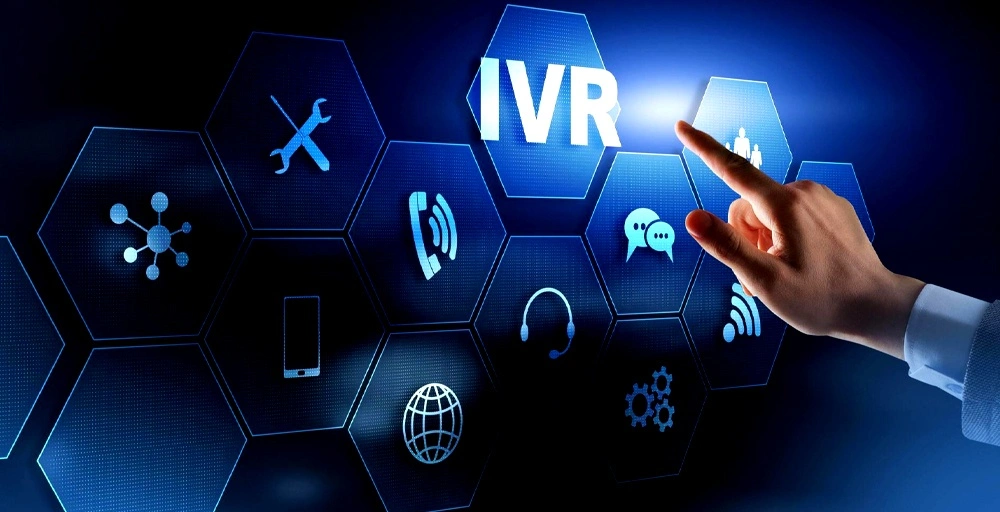
It is also known as a voice robot as it uses pre-recorded messages, text-to-speech technology, and a dual-tone multi-frequency (DTMF) interface allowing callers to interact with a computer-operated system through vice and DTMF tones input with a keypad.
Benefits of IVR
- Reduced call wait times: IVR systems help to reduce call wait times by quickly answering basic questions and directing the callers to the appropriate departments or agents.
- Scalability: IVR solutions let you handle many calls efficiently, making them appropriate for businesses of all sizes.
- Increased Productivity: By automating repetitive operations and inquiries, IVR allows humans to focus on complex and high-value activities, improving overall productivity and efficiency.
- 24/7 availability: Interactive voice response systems provide basic information and services even outside business hours, allowing customers to use them at their convenience.
- Integrations with CRM Systems: IVR solutions can integrate with various Customer Relationship Management(CRM) systems and enable businesses to have seamless access to customer data with relevant information to assist callers better.
Limitations of IVR
- Limited Flexibility: One of the main disadvantages of IVR systems is limited flexibility as they are structured in such a way that they can’t easily adapt to changing situations or changing needs as human agents can.
- Limited to predefined options: The key limitation of IVR systems is their reliance on predefined options. This means users can communicate with the system by responding to pre-recorded prompts or submitting particular commands.
- Navigation complexity: Complex menus with several options may confuse the users, making it difficult for them to select the right option and navigate the system efficiently.
- Limited customer engagement: IVR systems prioritize completing tasks swiftly rather than focusing on developing meaningful connections like human agents. This approach can lead to impersonal conversations making callers feel disconnected.
What is Intelligent Virtual Agent (IVA)?
Intelligent Virtual Agent(IVA) is an AI-powered software that matches human-like interactions to assist and support users. It can perform a variety of tasks such as answering questions, providing recommendations, executing transactions, and resolving issues across various communication platforms commonly used in customer service, sales, and support environments.
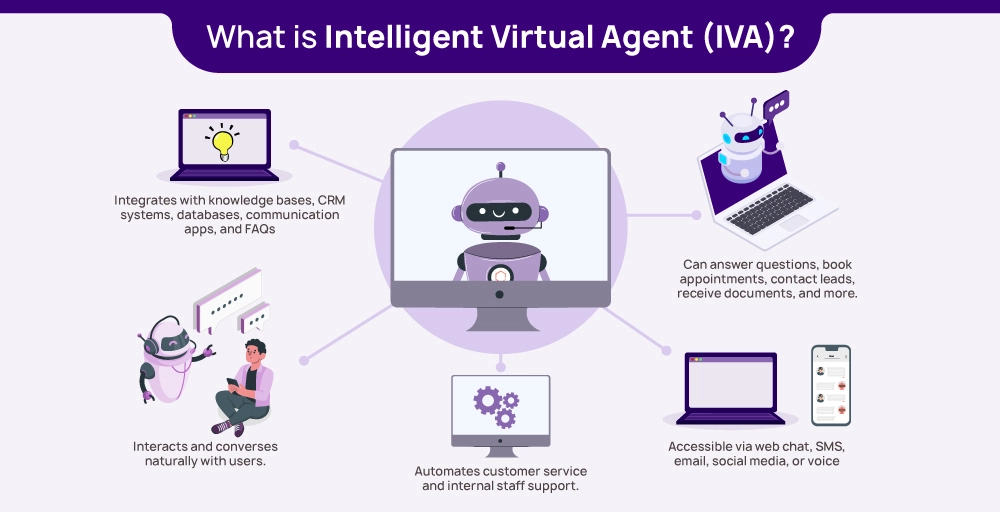
Unlike traditional chatbox, which relies on pre-programmed responses, IVAs use Natural Language Processing(NLP) and deep learning to boost the simplicity and success of consumer conversations.
Benefits of IVA
- Scalable customer support: They can respond to large volumes of customer inquiries simultaneously, reducing customer wait times and ensuring prompt responses.
- Enhanced Productivity: By freeing up the human representatives to the complex tasks IVAs focus on handling routine inquiries and tasks increasing overall productivity and efficiency.
- Cost efficiency: By automating repetitive tasks and inquiries and handling routine processes, IVAs reduce the dependency on human agents, leading to cost savings for businesses.
- 24/7 availability: By operating round the clock, they can offer assistance to customers at any time of the day or night, ensuring customers get support whenever they need it regardless of time zone differences or business hours.
- Improved brand image: By offering timely and dependable service around the clock, IVA helps to improve the brand image of the business.
Limitations of IVA
- Handling complex queries: As IVAs handle straightforward inquiries with predefined responses, they may struggle when need to face a complex scenario that requires human-like understanding.
- Integration challenges: Integrating IVAs with the current systems can be challenging and time-consuming as it requires technical expertise that leads to compatibility issues.
- Limited adaptability: As user behaviors and preferences change over time with the evolving time, IVAs may struggle to adapt to those changes, resulting in outdated or ineffective responses.
- Privacy and Security concerns: Privacy and security concerns may arise as, IVAs handle users’ sensitive information by interacting with customers across various digital channels, and collecting and processing personal data to provide personalized assistance.
IVA Vs IVR: What is the difference?
Both IVA and IVR are used for customer interactions but they differ in their functionalities and capabilities.
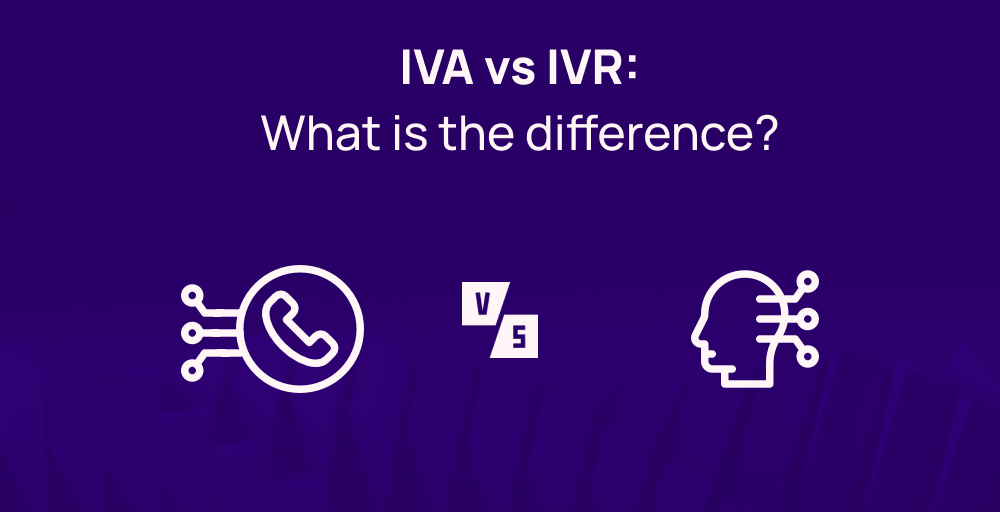
The Interactive Voice Response (IVR) system utilizes pre-recorded messages and voice recognition to interact with customers, route them to the appropriate services, and route their calls accordingly.
Conversely, IVA is a more advanced AI-powered solution. It can simulate human-like interactions across a wide range of platforms, including websites, apps, and messaging services.
In the comparison table, you can see the difference between the two platforms.
| Aspect | IVA | IVR |
| Meaning | Intelligent Virtual Agent | Interactive Voice Response |
| Technology | Natural Language Understanding(NLU) | Either NLU or Dual-Tone Multi-Frequency(DTMF) |
| Functionality | Provides conversational AI service | Focuses on routing calls to the human agents |
| Feature and customization | Offers advanced features | Limited features and customization options |
| Interactions | Natural language conversion | Menu-driven with limited options |
| Installation | Difficult to install | Easy to install |
| Business Type and Industry | Suitable for a business requiring complex support and personalization | Suitable for industries with simple inquiries |
| Cost | Higher | Lower |
🙋♀️ Personalization: IVA Vs IVR
IVR offers limited personalization providing predefined responses based on menu selections. As IVR provides a structured framework for routing calls and providing information, it cannot adapt responses based on individual caller preferences.
Whereas, IVA provides personalized interactions based on individual preferences analyzed from user data. It can understand each caller’s unique context and preferences by analyzing user data including past interactions, purchase history, and demographic information.
📐 Flexibility: IVA Vs IVR
In comparison of IVA vs IVR, IVA’s flexibility is high as it adapts to user input and context. This flexibility enables IVAs to handle a wide range of clients’ inquiries adjusting their responses in real-time to match the unique demands of unique callers.
On the other hand, the flexibility of IVR is limited as it uses pre-defined options. Although it can effectively handle straightforward tasks and provide basic information, it lacks the ability to perform more complex queries that result in a less adaptable user experience.
💼 Use Cases or Industry: IVR Vs IVA
IVA is used by industries like E-commerce, retail, customer service, and healthcare for use cases like handling complex inquiries, personalized service, advanced self-service, and proactive assistance.
Whereas, IVR is used by industries like banking and finance, telecommunications, healthcare, and travel and hospitality for use cases like routing calls, providing basic information, data collection, and self-service options.
🤝 Customer Engagement: IVR Vs IVA
The customer engagement of IVR is transactional which is just focused on completing tasks efficiently. On the other hand, IVA has interactive engagement that is aimed at building client relationships through individualized interactions.
💰 Pricing Difference: IVR Vs IVA
In terms of pricing, IVR and IVA differ based on a variety of factors, such as functionality, customization options, and vendor pricing models. Generally, the IVR pricing structure is lower compared to IVA.
IVR pricing models are based on factors like the number of phone lines, minutes of usage, and other additional features like speech recognition. Whereas, the IVA pricing model is based on factors like the number of interactions, level of customization, or usage of additional features like personalized recommendations and analytics.
Simple Setup, Powerful Results: KrispCall’s IVR – Your Automation Dream
KrispCall can be the perfect fit 😃 for your business if you are handling a large number of incoming calls. With KrispCall’s advanced IVR system, you can design personalized call flows that align perfectly with your brand image and customer service goals.
It also helps to prioritize efficiency, ensuring that every action is streamlined and productive. It helps to decrease the call wait time and risk of customer irritation by automating routine tasks and guiding callers to the appropriate destinations.
KrispCall’s IVR Features:
- Call Forwarding: Never miss a call, Customizable call forwarding for busy professionals
- Call analytics: Track the trends and identify call data patterns for predicting future needs and make proactive adjustments to your organization
- Scalability: Adapt resources up or down as your needs
- Unified Callbox: One convenient place to communicate effortlessly and instantly with your teams and customers
- Voicemail: Never miss a message even if you are unavailable
Find out more about KrispCall by scheduling a free demo.
IVA vs. IVR: Which one is best for your business?
Ultimately, choosing the best one between 🤔 IVA and IVR depends on factors like interaction complexity, the channels through which you interact with clients, and your budget.
IVR is ideal for small businesses like banking, finance, telecommunication, healthcare, and travel with mostly simple inquiries. It is more affordable and easier to set up typically suitable for smaller budgets. It has limited features and customization options.
Nonetheless, IVA is ideal for industries that require complex support, personalization, and self-service options. It involves higher investment and can improve customer experience and efficiency. It offers advanced features like self-service, proactive assistance, and extensive customization.
You can choose KrispCall’s IVR system to enhance your business productivity and streamline communication operations.
FAQs
What factors should businesses consider when deciding whether to upgrade from IVR systems to IVA systems?
When deciding whether to upgrade from IVR systems to IVA systems businesses should consider the factors such as budget, customer service needs, and technological capabilities. Along with that, the possible benefits of improved personalization and advanced features provided by IVAs are a must before upgrading from IVRs to IVAs.
What is IVA in a contact center?
IVA in contact is a powerful technology powered by AI and NLP that assists customers with inquiries and tasks across many channels increasing efficiency and customer satisfaction.
What is the difference between a chatbot and a virtual assistant?
The difference between a chatbot and a virtual assistant is that a chatbot mainly focuses on gathering customer information and understanding the intent whereas, a virtual assistant can perform business tasks like updating customer contact details, sending meeting reminders, and providing real-time meeting notes.

